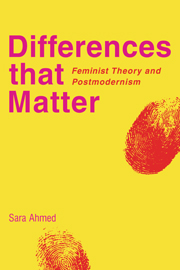2 - Ethics
Published online by Cambridge University Press: 22 September 2009
Summary
What is at stake in the production of a ‘postmodern ethics’? This is a difficult question that demands a cautious analysis. Postmodern ethics does not exist prior to its articulation in specific texts. The designation of ‘postmodern ethics’ as a field or position involves a form of writing which fills both ‘postmodernism’ and ‘ethics’ with meaning in the event of conjoining the terms. The importance of asking how postmodernism writes itself as an ethics is clear if we think through some of the claims made on its behalf. Some of these claims assume that postmodernism, in the first instance, involves the erasure of the ethical or the substitution of ethics by aesthetics (Bauman 1993: 2). Consider the sub-title of one book: ‘Postmodernism and the Rediscovery of Value’ (Squires 1993). The term ‘rediscovery’ is powerful and suggestive. It evokes a narrative: the ethical was discovered, but that discovery was negated or forgotten in postmodernism and, as a result, after the postmodern, one can only rediscover what has already been lost. Such a narrative of departure and return is clear in the introduction to the book: ‘the contributors to this collection share, from admittedly distinct perspectives, a common concern to accept and retain some of the gains made by the critical mores of postmodernism, but also to recognise and surpass the problems in these attempts to suppress value’ (Squires 1993: 5). Here postmodernism becomes defined as an intentional suppression of value and evaluation.
- Type
- Chapter
- Information
- Differences that MatterFeminist Theory and Postmodernism, pp. 45 - 67Publisher: Cambridge University PressPrint publication year: 1998



